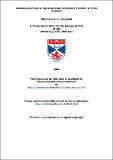Normalisation & equivalence in proof theory & type theory
Abstract
At the heart of the connections between Proof Theory and Type Theory, the Curry-Howard correspondence provides proof-terms with computational features and equational theories, i.e. notions of normalisation and equivalence. This dissertation contributes to extend its framework in the directions of proof-theoretic formalisms (such as sequent calculus) that are appealing for logical purposes like proof-search, powerful systems beyond propositional logic such as type theories, and classical (rather than intuitionistic) reasoning.
Part I is entitled Proof-terms for Intuitionistic Implicational Logic. Its contributions use rewriting techniques on proof-terms for natural deduction (Lambda-calculus) and sequent calculus, and investigate normalisation and cut-elimination, with call-by-name and call-by-value semantics. In particular, it introduces proof-term calculi for multiplicative natural deduction and for the depth-bounded sequent calculus G4. The former gives rise to the calculus Lambdalxr with explicit substitutions, weakenings and contractions that refines the Lambda-calculus and Beta-reduction, and preserves strong normalisation with a full notion of composition of substitutions. The latter gives a new insight to cut-elimination in G4.
Part II, entitled Type Theory in Sequent Calculus develops a theory of Pure Type Sequent Calculi (PTSC), which are sequent calculi that are equivalent (with respect to provability and normalisation) to Pure Type Systems but better suited for proof-search, in connection with proof-assistant tactics and proof-term enumeration algorithms.
Part III, entitled Towards Classical Logic, presents some approaches to classical type theory. In particular it develops a sequent calculus for a classical version of System F_omega. Beyond such a type theory, the notion of equivalence of classical proofs becomes crucial and, with such a notion based on parallel rewriting in the Calculus of Structures, we compute canonical representatives of equivalent proofs.
Type
Thesis, PhD Doctor of Philosophy
Collections
Items in the St Andrews Research Repository are protected by copyright, with all rights reserved, unless otherwise indicated.

